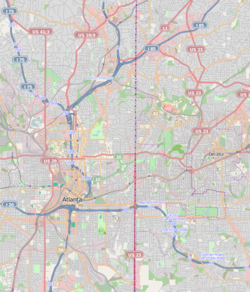Ansley Park is an intown residential district in Atlanta, Georgia, located just east of Midtown and west of Piedmont Park. When developed in 1905-1908, it was the first Atlanta suburban neighborhood designed for automobiles,[2] featuring wide, winding roads rather than the grid pattern typical of older streetcar suburbs. Streets were planned like parkways with extensive landscaping, while Winn Park and McClatchey Park are themselves long and narrow, extending deep into the neighborhood.
Ansley Park Historic District | |
 | |
| Location | Atlanta, Georgia |
|---|---|
| Coordinates | 33°47′44″N 84°22′45″W / 33.79556°N 84.37917°W |
| Built | 1904 |
| Architect | Ruff, S.Z.; Reid, Neel |
| Architectural style | Late 19th And Early 20th Century American Movements, Late 19th And 20th Century Revivals, Queen Anne |
| NRHP reference No. | 79000717 (original) 15000466 (increase) |
| Significant dates | |
| Added to NRHP | April 20, 1979[1] |
| Boundary increase | July 27, 2015 |

Ansley Golf Club borders the district. The neighborhood was largely completed by 1930 and covers 275 acres (1.11 km2). It has been designated a Historic District on the National Register of Historic Places.[3] In 2008, the median household income for the neighborhood was $226,335.[4] To the immediate east of the golf course is the Eastside Trail interim hiking trail, part of the BeltLine ring of parks and trails around the central city.
History
editThe area was developed by rail and real estate magnate Edwin P. Ansley, while George W. Adair, Jr. and Forrest Adair marketed the lots. It was marketed as an alternative for the city's elite to Inman Park, the most fashionable residential neighborhood in the city at the time. It was more fashionably located, astride Peachtree Street and adjacent to the city's largest public park.[5] With Edwin Ansley's former residence serving as the governor's mansion and the Piedmont Driving Club adjacent, the area remained upscale until the 1960s when a slight decline was experienced with some residences turning into boarding houses. However, residents turned this decline around and the area never experienced the deep decline in the 1950s-1960s due to suburbanization, as neighborhoods like Inman Park did.[2]
Historic district
editContributing properties in the Historic District include:
Education
editAnsley Park residents are zoned to schools in the Atlanta Public Schools.
Zoned schools include:
- Morningside Elementary School[6][7]
- Inman Middle School
- Midtown High School
Notable people
edit- Charles Brewer, founder of MindSpring
- Tom Gugliotta, former NBA player
- Al Horford, member of the Atlanta Hawks, and wife Amelia Vega, former Miss Universe
- Lonnie Johnson, inventor of the Super Soaker,[8] and Nerf Guns[9]
- Hannah Salwen and Kevin Salwen, authors of The Power of Half
- Elbert Tuttle, federal judge who played a prominent role in civil rights cases
References
edit- ^ "National Register Information System". National Register of Historic Places. National Park Service. April 15, 2008.
- ^ a b Squires, Gregory D. (April 16, 2018). Urban Sprawl: Causes, Consequences, & Policy Responses. The Urban Institute. ISBN 9780877667094 – via Google Books.
- ^ "Ansley Park". Atlanta: A National Register of Historic Places Travel Itinerary. National Park Service. October 8, 2008.
- ^ PhD, Stephen R. Higley. "Neighborhood Summary By Metro Area - The Higley 1000". higley1000.com. Archived from the original on April 8, 2019. Retrieved May 9, 2009.
- ^ "The Atlanta Historical Journal". Atlanta Historical Society. April 16, 1982 – via Google Books.
- ^ "Morningside Elementary School / Home". Morningsideschool.org.
- ^ "Morningside Elementary School". ivic02.residentinteractive.com.
- ^ [1] [dead link]
- ^ Johnson, Lonnie G.; Applewhite, John T. (September 10, 1996), Pneumatic launcher for a toy projectile and the like, retrieved October 10, 2016
External links
editMedia related to Ansley Park at Wikimedia Commons
